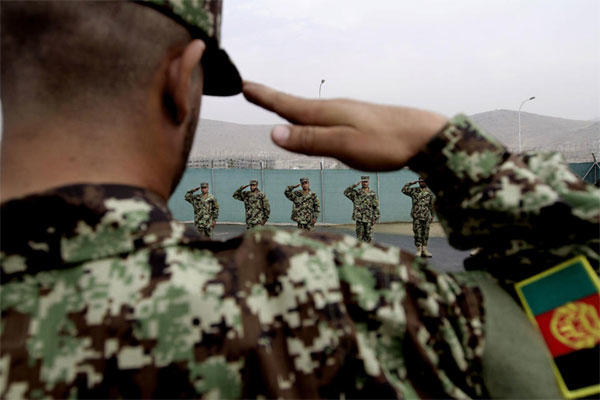Foreign aid that sustains the shaky Kabul government could dry up as U.S. and allied forces withdraw from Afghanistan, putting at risk the gains of 13 years of war, a government watchdog agency warned Tuesday.
Aid to Afghanistan has been on a downward trend since 2010 and "history suggests it will fall even more sharply after U.S. and coalition troops are withdrawn," the Special Inspector General for Afghanistan Reconstruction (SIGAR) said in its quarterly report to Congress.
"Although donors have pledged large-scale aid for years to come, their generosity may wane as their presence declines," the report said.
Afghanistan routinely runs huge budget deficits due to revenue shortfalls, largely caused by its difficulties in imposing or collecting taxes. The current Kabul government budget of about $7.6 billion includes $4.8 billion in donor grants, or more than 60 percent of the total, the IG said.
"Even if Afghanistan satisfies current or future aid-qualifying benchmarks, international commitments are not necessarily guaranteed," the report said.
The report cited the Kabul-based Afghanistan Research and Evaluation Unit as predicting major cuts in aid as coalition forces withdraw. The result would be "capital flight, heightened risks for investments, and the collapse of drivers of economic growth such as reconstruction, logistics, and transportation," the report said.
To underline the drawbacks to investing in Afghanistan, the SIGAR report noted that the U.S. has spent $104 billion on reconstruction in Afghanistan since 2002 with mixed results. The $104 billion exceeded the total amount spent on the Marshall Plan for the reconstruction of Europe after World War II, the report said.
The $13.3 billion appropriated through 1952 for the Marshall plan, named for former Army general and Secretary of State George C. Marshall, would translate into about $103.4 billion in today’s dollars, SIGAR said.
The release of the SIGAR report came as the House Armed Services Committee heard arguments against the timelines in President Obama’s plan that would withdraw U.S. forces by 2017.
Currently, about 30,000 U.S. troops are in Afghanistan – down from about 100,000 in 2011. All U.S. combat forces are to withdraw by the end of this year.
In May, Obama announced a plan for a continued U.S. troop presence past 2014 if a new Bilateral Security Agreement with the Afghan government can be reached.
The Obama plan called for 9,800 U.S. troops to be in Afghanistan in 2015. That number would be halved in 2016, and all U.S. forces would be out in 2017.
At the HASC hearing, several experts argued for an indefinite U.S. troop presence in Afghanistan to bolster the Afghan National Security Forces and counter a resurgence of the Taliban and al-Qaeda.
"My central argument is that the United States should not make, as its top priority, removing all combat units from Afghanistan in 2016, as President Obama now intends and much of the country appears to wish," Michael O’Hanlon, a Brookings Institution analyst, said during the hearing.
The U.S. "should seek to stay in Afghanistan indefinitely, largely for counter-terrorism purposes that pertain directly to the national security of the United States," O’Hanlon said.
Ronald Neumann, the former U.S. ambassador to Afghanistan, said, "Maintaining our aid and our presence are vital" to shoring up the Kabul government and ANSF.
Anthony Cordesman, a Center For Strategic and International Studies analyst, went so far as to hold up a copy of the official U.S. Army history of Vietnam in warning that the U.S. would be "repeating the mistake of Vietnam" by leaving on the Obama timetable.
-- Richard Sisk can be reached at richard.sisk@monster.com





























